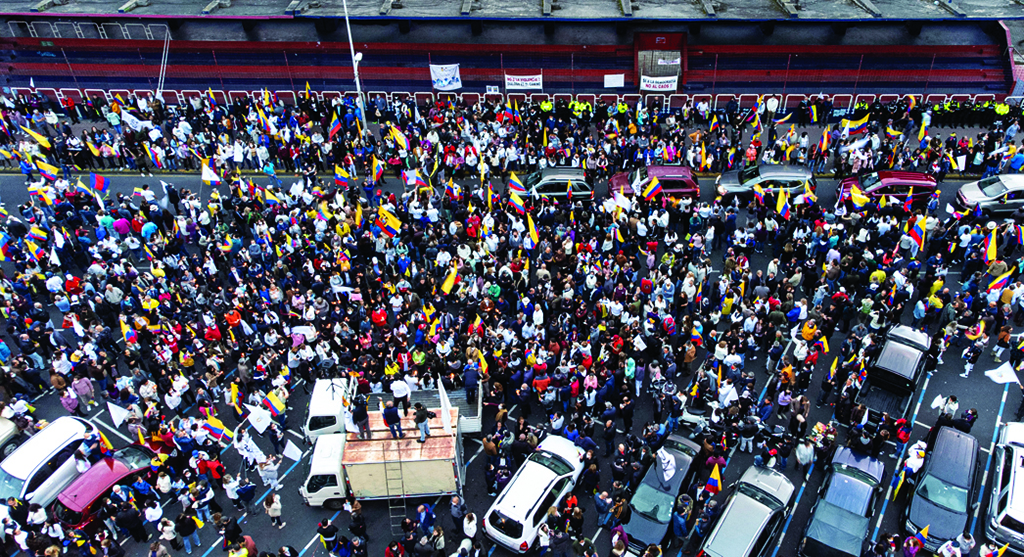QUITO: Holding rotten peppers in her hands, Mariana Morales says she has been unable to open her stall at the Santa Clara market north of Ecuador's capital Quito for a week. Usually overflowing with fruits and vegetables, the market now is home to tarp-covered display cases, empty trays and deserted stalls - the effects of two weeks of nationwide Indigenous-led protests that are being felt far and wide. In Guayaquil, the country's second largest city, Andean produce such as potatoes and corn are already in short supply.
"The situation is difficult because there is no one left to bring food from the highlands," said Rosa, an Indigenous woman who has sold vegetables in a port market in the southwestern city for 15 years. An estimated 14,000 protesters are taking part in the nationwide show of discontent against rising hardship, particularly increased fuel prices, in an economy dealt a serious blow by the coronavirus pandemic. The ironic side effect of their demonstrations has been a worsening of several economic factors: rising prices, shortages and deserted markets.
While the largest mobilization has by far been in the capital, where the number of protesters is close to 10,000 - numerous checkpoints and barricades block the main roads throughout the country, in particular on the vital Panamerican highway. The country's energy ministry warned Sunday that those roadblocks and barricades could end up forcing a halt to oil production within 48 hours, which would be a dire development for an economy depending on oil exports.
'Everything is too expensive'
Since the beginning of the roadblocks, Guayaquil's only wholesale market has been out of stock. The supply center normally receives nearly 3,000 truckloads of food from the Andean highlands every day, but that figure has dropped by almost 70 percent. In Quito, where main access roads are blocked intermittently, authorities are trying to organize protection for trucks by the army and police. On Thursday, an attack on one of these conveys left 17 soldiers injured.
Santa Clara, like five other markets in the capital, was forced to close for several days and only partially resumed operations on Saturday. "The peppers were brand new and now it's all wasted," Morales said, plunging her fingers into the rotten produce. Despite the ruined vegetables, the 69-year-old has not gone to the wholesale market to stock back up due to the explosion in prices, explaining: "A bag of carrots that used to cost $25 is now worth $100."
Consumers are finding it difficult to afford a number of products, from eggs to chicken to cooking fuel. Morales said it gives her a "guilty conscience" to charge customers a dollar for just one green onion stalk. Silvana Quimi, a housewife in Guayaquil where food prices have doubled in one week, said that now "everything is too expensive." "Before, I was sold a kilo of tomatoes for half a dollar, now it costs me a dollar."
Things are similar in the capital where a bunch of bananas, which used to cost $1.00, now costs $2.00. "What is available costs an arm and a leg," said Agustin Pazmino, a 56-year-old trader. Conservative President Guillermo Lasso "during his campaign promised us heaven, but we live in hell," he said. A no-confidence hearing over what opposition lawmakers say is Lasso's role in the protests resumed in Congress for a second day late Sunday. Five people have died so far. The National Assembly will eventually vote on whether to oust Lasso, a former banker who took power a year ago.
Fuel prices
Meanwhile, President Guillermo Lasso announced Sunday that Ecuador will cut fuel prices, which had sparked weeks of demonstrations, though not by as much as protesters have demanded. "I have decided to reduce the price of gasoline by 10 cents per gallon and diesel also by 10 cents per gallon," he said in a television and radio address. The powerful Confederation of Indigenous Nationalities of Ecuador (Conaie), which since June 13 has been blocking roads and occupying oil wells in different parts of the country, had demanded a reduction in prices by an additional 30 cents and 35 cents, respectively.
Earlier on Sunday, the country's energy ministry warned that oil production had reached a "critical" level and could be halted entirely within 48 hours if the protests and roadblocks continued. The protests, which are also against rising living costs, have crippled transportation in Ecuador, with roadblocks set up in 19 of the oil-rich country's 24 provinces.
"Oil production is at a critical level," the ministry said in a statement. "If this situation continues, the country's oil production will be suspended in less than 48 hours as vandalism, the seizure of oil wells and road closures have prevented the transport of equipment and diesel needed to keep operations going." "Today, the figures show a decrease of more than 50 percent" in production, which was at roughly 520,000 barrels per day before the protests, it said. Ecuador's economy is highly dependent on oil revenues, with 65 percent of output exported in the first four months of 2022.
Impeachment debate
Late on Sunday, the country's parliament suspended seven hours of debate over whether to impeach Lasso, with proceedings set to resume on Tuesday. At least 20 members of parliament are still due to speak. The president's impeachment would require 92 of the 137 possible votes in the National Assembly, where the opposition holds a fragmented majority. MPs will have a maximum of 72 hours to vote following the end of the debate. An estimated 14,000 protesters have taken part in the nationwide demonstrations, most of them in Quito. Shortages are already being reported in the capital, where prices have soared.- AFP











